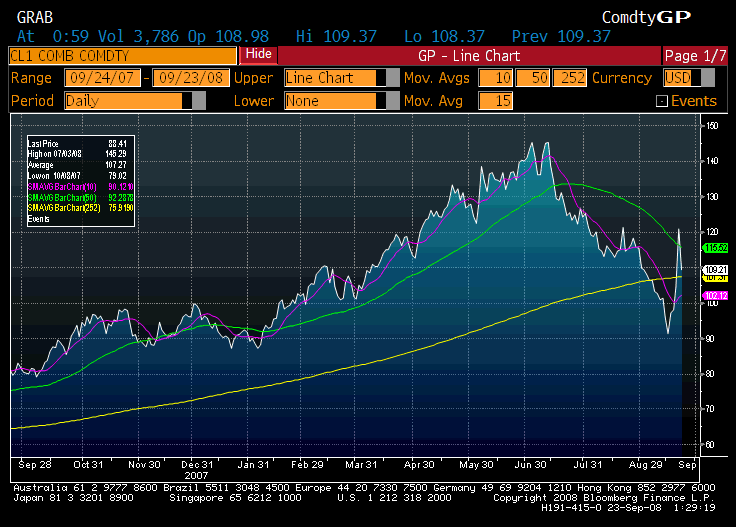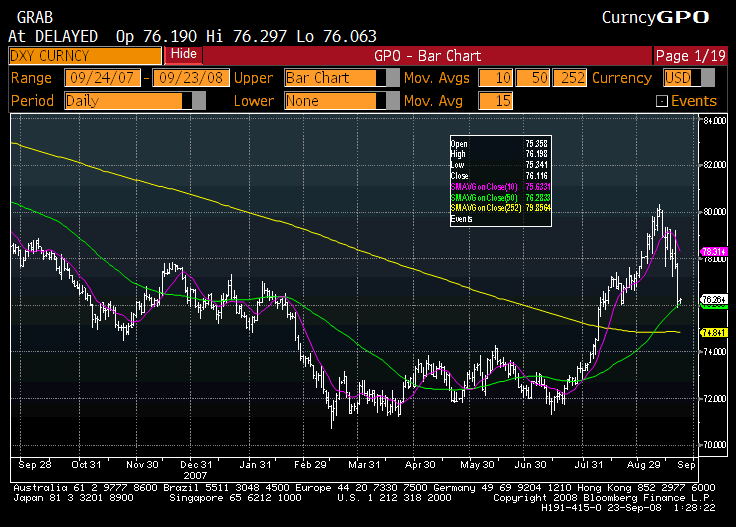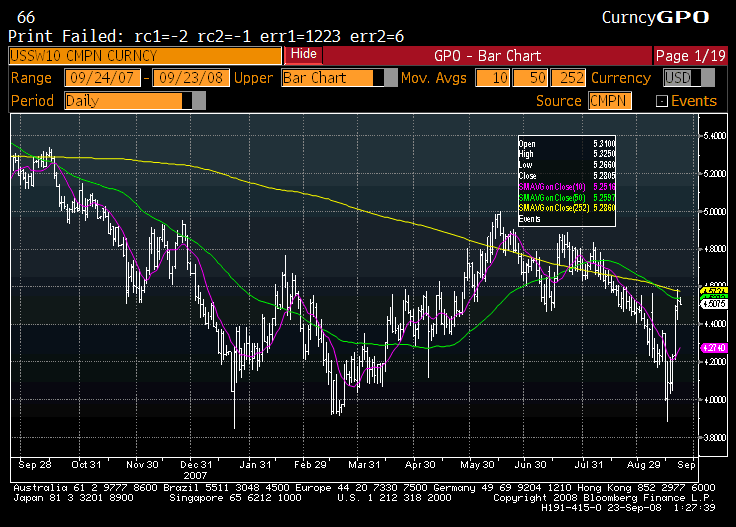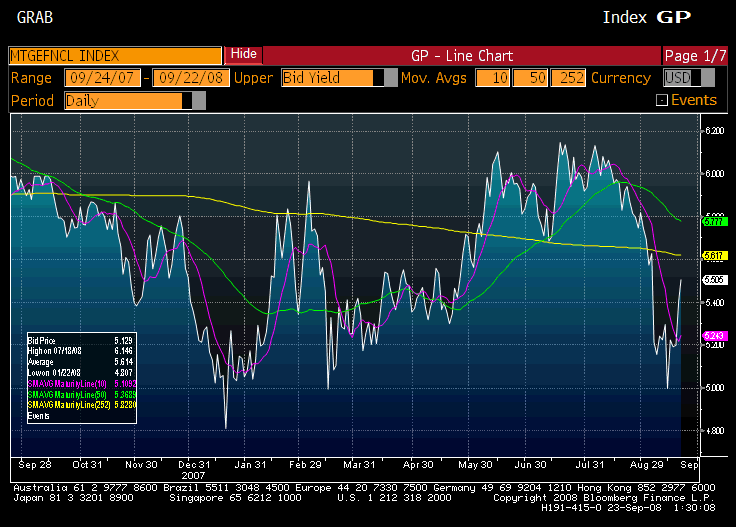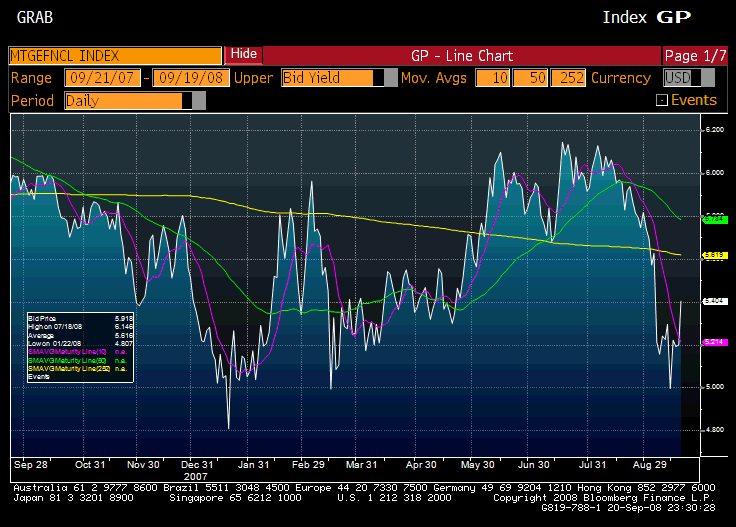Debt and Sweat
Ordinarily, when I sit down top blog, I know what I want to write.? That’s not true now.? Yes, I could do a few book reviews.? I have six books read, and ready to go, but given the volatility of the markets, I feel I have to say something about the current activity.
I am a strong believer that there are few free lunches.? If there are simple policies that will easily produce prosperity, they would likely have been done by now.
As I have commented before, what we are seeing now is a shift in debt from the banks to the government.? Banks get capital, the government gets debt, and the money for the debt comes from three places: taxpayers, foreign lenders (central banks, probably) and perhaps at some point, the Federal Reserve could buy it (whether they monetize it or not is another question).? As jck noted yesterday, this has led to a selloff in Treasuries.? (Interesting that it happened on a day when the cash markets were closed, but the futures markets were open.? The reaction of cash bond market today is similar to that which the futures market exprerienced yesterday.)
Which brings me to my first point.? Today, when the rally in the fixed income markets gets reported (the markets again, were closed yesterday, you will likely hear that spreads rallied sharply.? But watch for the discussion of yields and prices (if there is any).? It’s quite possible that yields rise from Friday to the close of business today.
Second point, today $250 billion of the $700 billion got used on nine big/critical banks.? Now, this may have been somewhat coercive to some of the nine banks; as was said at Bloomberg:
None of banks getting government money was given a choice about it, said one of the people familiar with the plans. All of the banks involved will have to submit to compensation restrictions, said the person.
The government will also guarantee the banks’ newly issued senior unsecured debt, making it easier for them to refinance their liabilities, the person said.
Possibly the following message was delivered, “Be a good boy and get in line.? This is good for the nation, and we won’t be around for a decade.? You want to be a survivor, right?? You want friendly regulators when we review the levels at which you are marking your illiquid assets?? We thought so.? Sign here.”? (No surprise that Goldman then applies for a NY State, rather than Federal bank charter.? State regulation, particularly when you are a local champion, is much more flexible.? Just ask AIG. 😉 )
Though this leads to a short-term bounce in bank share prices, the long term effects are less clear, which brings me to my third point.? It’s one thing to bolster their balance sheets.? It is another to get them to lend, particularly in the bear phase of the credit cycle.? Also, as leverage comes down, and it will come down, so will profitability at the investment banks, and probably other banks as well.? Securitization will be less common, eliminating hidden leverage that allowed for less capital.
The same thing is going on in Europe, though they actually think about how they might pay for the bailouts.? In the UK, it pushes the national debt to GDP ratio to 100%.? As it gets closer to 150%, the international debt markets usually start to choke.? We have traded bank credit risk for national solvency risk at the margin.? Maybe that will be different here, if only government creditworthiness is perceived to be safe.? It is a “new era,” right? 🙁
I find it interesting that Barclays is refusing help.? Either the UK regulators aren’t so coercive as those in the US, or Barclays is not as levered as I thought.? Or, it could be hubris on the part of Barclays’ management team.
Even Japan is getting into the act, though these measures seem so weak that I wonder why they would bother.? The government and Bank of Japan stop selling bank shares, and allow companies to buy shares back more aggressively.? That may push share prices up in the short run, but it substitutes debt for equity, which shouldn’t have much of a long-term impact.
On the Central Banking Front
Now, with the seemingly limitless amount of US liquidity being to the short end of the US money markets, you would think that we would get a bigger move than we have gotten so far. This will take time, but watch the yield as well as the spread.? Also remember that LIBOR has become somewhat of a fiction at present.? There many quotes, but not so many loans to validate the quotes.
What is being done that is new?
- TAF expanded to $900 billion.
- New commerical paper program where the Fed backstops the A-1/P-1/F1 CP market, including ABCP.? Terms here.? FAQ here.? This is big, and it is much easier to start such a program than to end it.? It is difficult to end any program where credit is granted on less than commercial terms.? My guess is that it will be extended past its April 30th, 2009 planned expiry date.
- Swap agreements allowing unlimited dollar liquidity to foreign entities through agreements with their central banks.
- The Fed can now pay interest on reserve balances held at the Fed, which allows them to increase their balance sheet significantly.? In one sense, they become the Fed funds market.
What is not new is the idea that all we have to do is restore confidence, and everything will be fine.? No, we have to delever, and the US Gowernment is included in the list of those that need to delever.? There is no national reform going on here, but merely a shifting of obligations from private to public hands.
For investors:
For those that are investors, the biggest bounces tend to occur during depressionary conditions.? I would not get overly excited about the rally yesterday.? As John Authers at the FT points out, given the extreme changes being made, there should have been a bounce.? The question is whether it will persist.? I was a net seller into the rally toward the end of the day.? I think we have more troubles ahead.? Two things to watch:
- LIBOR, CP yields and the TED spread. (The short end)
- Overall yields of medium-to-long Treasuries and other long-dated debt.? (The long end.)
I expect yields to rise, even if some spread relationships fall.? The added financing needed by the US government is large.? Let us see where Treasury buyers have interest.
There are elements of this that remind me of my The US Dollar and the Five Stages of Grieving piece. This is for two reasons: first, we are asking foreign entities to hold more dollar claims at a time when they are stuffed full of them.? Second, this phase of the credit crisis reminds me of the “bargaining” phase of the five stages of grieving.? We are past a long denial phase, and the anger continues, but now we bargain that these proposals will allow us to escape the pain that comes from delevering.
I’m skeptical, but I hope that I am wrong, lest we get to the fourth stage “depression,” before we finally reach “acceptance.”? As it is, I am looking for companies with blaance sheets strong enough to survive the worst.? That is my task for the next few days.



